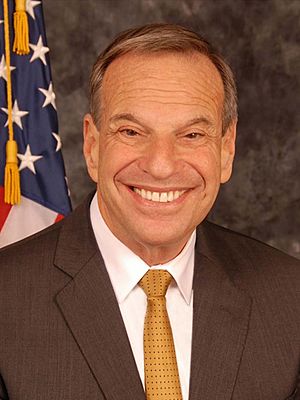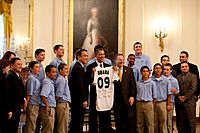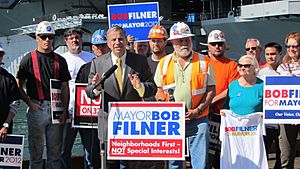Bob Filner facts for kids
Quick facts for kids
Bob Filner
|
|
|---|---|

Official portrait, 2013
|
|
| 35th Mayor of San Diego | |
| In office December 3, 2012 – August 30, 2013 |
|
| Preceded by | Jerry Sanders |
| Succeeded by | Todd Gloria (acting) |
| Ranking Member of the House Veterans' Affairs Committee | |
| In office January 3, 2011 – December 3, 2012 |
|
| Preceded by | Steve Buyer |
| Succeeded by | Mike Michaud |
| Chair of the House Veterans' Affairs Committee | |
| In office January 4, 2007 – January 3, 2011 |
|
| Preceded by | Steve Buyer |
| Succeeded by | Jeff Miller |
| Member of the U.S. House of Representatives from California |
|
| In office January 3, 1993 – December 3, 2012 |
|
| Preceded by | Constituency established |
| Succeeded by | Juan Vargas |
| Constituency | 50th district (1993–2003) 51st district (2003–2012) |
| Member of the San Diego City Council from the 8th district |
|
| In office December 1987 – January 3, 1993 |
|
| Preceded by | Uvaldo Martinez |
| Succeeded by | Juan Vargas |
| Personal details | |
| Born |
Robert Earl Filner
September 4, 1942 Pittsburgh, Pennsylvania, U.S. |
| Died | April 20, 2025 (aged 82) Costa Mesa, California U.S. |
| Political party | Democratic |
| Spouses |
Barbara Christy
(divorced)Jane Merrill
(div. 2011) |
| Education | Cornell University (BA, PhD) University of Delaware (MA) |
Robert Earl Filner (September 4, 1942 – April 20, 2025) was an American politician. He served as the 35th mayor of San Diego from December 2012 to August 2013. He resigned from his position due to serious concerns about his behavior. He was a member of the Democratic Party.
Before becoming mayor, Filner was a U.S. representative for California's 51st and 50th districts. He served in Congress from 1993 to 2012. He also led the House Committee on Veterans' Affairs from 2007 to 2011.
Contents
Early Life and Education
Filner was born in Pittsburgh, Pennsylvania, in the Squirrel Hill neighborhood. He was from a Jewish family. His father was a labor union organizer and a U.S. Army veteran.
He went to Cornell University. There, he worked on the student newspaper, The Cornell Daily Sun. He also took part in civil rights demonstrations. In June 1961, he was arrested in Jackson, Mississippi, as a Freedom Rider. He was charged with "disturbing the peace." He stayed in jail for two months because he refused to pay bail.
He earned a degree in chemistry from Cornell in 1963. Six years later, he received his doctorate in history of science from Cornell.
Political Career Highlights
After getting his PhD, Filner moved to San Diego. He became a history professor at San Diego State University for over 20 years.
He also worked for U.S. Senator Hubert Humphrey and Congressman Don Fraser in the 1970s. Later, he worked for Congressman Jim Bates in 1984.
His career in elected office began in 1979. He ran for the San Diego Unified School District Board of Education. He won because he opposed closing a local school. His focus on basic education was popular. His colleagues chose him as president of the board in 1982. In 1987, he was elected to the San Diego City Council. He was reelected in 1991. His fellow council members then elected him deputy mayor of San Diego.
Serving in the U.S. House of Representatives

California gained seven new seats in Congress after the 1990 census. One of these was the 50th District in south San Diego. This district was later renamed the 51st District after the 2000 census. It is one of the most diverse districts in the country. It includes parts of San Diego, Chula Vista, National City, and all of Imperial County. It also covers most of California's border with Mexico.
In 1992, Filner ran in the Democratic primary for this new seat. He won by a small margin. The district was heavily Democratic. His victory in the general election was expected. He was reelected nine times without strong opposition from the Republican Party. He ran unopposed in 1998.
Filner decided not to run for Congress again in 2012. Instead, he chose to run for mayor of San Diego. He resigned from the House of Representatives on December 3, 2012, to become mayor.
Filner had a strong rivalry with Juan Vargas, another Democratic politician. Vargas ran against Filner in the Democratic primary three times. However, in the 2012 mayoral race, Vargas supported Filner. Vargas was then elected to Filner's former seat in Congress.
Key Issues and Focus Areas
Filner was a founding member of the Congressional Progressive Caucus. He also belonged to the Congressional Motorcycle Safety Caucus and the International Conservation Caucus. He supported a resolution in 2008 for National Aviation Maintenance Technician Day. While in Congress, Filner was known for his direct approach. He often personally helped people in his district with their problems.
Supporting Veterans
Filner was a member of the House Committee on Veterans' Affairs. He became the chairman when Democrats gained control of the House after the 2006 election. As chairman, Filner worked to get more funding for veterans' benefits. He also pushed for increased spending on veterans' healthcare. He supported a new GI bill for veterans who served in Afghanistan and Iraq. He remained the top Democrat on the committee after Republicans took back the House in the 2010 election.
Focus on Filipino Community Issues
Filner's district in south San Diego had a large population of Filipino Americans. Because of this, Filner focused on issues important to the Philippines and Filipino veterans while in Congress. He helped pass laws that allowed Filipino veterans to receive a small payment from the government if they moved back to the Philippines. He also worked on burial benefits and access to VA clinics for them.
In 2009, Filner helped secure $198 million in pension benefits for Filipino veterans. These veterans had served the United States in World War II. The money came as a $15,000 payment as part of the 2009 stimulus bill.
Airport Incident
In August 2007, Filner had a disagreement with an airline employee at Dulles International Airport. He was upset because his baggage had not arrived. He faced charges related to the incident. He later pleaded guilty to trespassing. The House Ethics Committee looked into the event, but the investigation was later closed.
Committee Assignments in Congress
- Committee on Transportation and Infrastructure
- Subcommittee on Aviation
- Subcommittee on Highways and Transit
- Subcommittee on Water Resources and Environment
- Committee on Veterans' Affairs (Ranking Member)
Serving as Mayor of San Diego
Mayoral Election
On June 8, 2011, Filner announced he would run for mayor of San Diego in the 2012 election. He decided not to seek reelection to Congress. In the primary election on June 5, 2012, he came in second place. He then faced city councilmember Carl DeMaio in the runoff election in November 2012. Filner won the election. At 70 years old, he became San Diego's first elected Democratic mayor since 1992.
Time as Mayor
In his first speech as mayor, Filner promised to focus on improving San Diego's neighborhoods. He also aimed to boost city services, increase public safety staff, create jobs, and build stronger ties with Tijuana.
In January 2013, Filner instructed the San Diego Police Department to stop enforcing certain rules against health-related facilities. In April 2013, he suggested a new rule to give these facilities permanent legal status. However, the City Council did not approve it.
In February 2013, Filner caused discussion by not approving funding for the Tourism Marketing District. This group promotes San Diego tourism. Filner wanted changes that would increase hotel worker salaries and protect the city from certain costs. After a legal ruling, Filner and the hoteliers reached an agreement. He then signed the contract.
Resignation from Office
In July 2013, concerns were raised about Filner's behavior. Several people called for his resignation as mayor. Filner apologized and said he was seeking professional help. His chief of staff resigned, and a new chief of staff also resigned shortly after.
More people came forward with claims about Filner's conduct. Many political leaders, including U.S. senators and members of the City Council, called for him to resign.
Filner announced he would take a leave of absence for "intensive therapy." He started the treatment but ended it early. The city of San Diego decided not to pay his legal fees for a lawsuit related to his conduct. The City Council later agreed to a joint legal defense as part of a resignation deal.
In August 2013, groups began efforts to recall Filner from office. They started collecting signatures to force a special election. Less than a week after the signature drive began, Filner agreed to resign.
On August 21, 2013, Filner reached an agreement with the city. The City Council voted to accept his resignation. His resignation became effective on August 30, 2013. City Council president Todd Gloria served as interim mayor. A special election was held to choose a new mayor. Kevin Faulconer was elected as the next mayor in February 2014.
Legal Outcome
In October 2013, Filner pleaded guilty in San Diego Superior Court to three criminal charges. These charges were related to his conduct. He received a sentence that included three months of house arrest and three years of probation. He completed his house arrest in April 2014.
Personal Life and Death
Filner was married to Barbara (Christy) Filner, a retired mediation specialist. They had two adult children, a son and a daughter. They later divorced.
He was also married to Jane Merrill, but they divorced in 2011.
In 2012, after being elected mayor, Filner introduced his fiancée, Bronwyn Ingram. She was a disability analyst. In July 2013, Ingram announced that their engagement was called off. She stated that the relationship ended due to his verbal abuse and inappropriate messages.
Bob Filner passed away at an assisted living home in Costa Mesa, California, on April 20, 2025. He was 82 years old.
Images for kids
See also
 In Spanish: Bob Filner para niños
In Spanish: Bob Filner para niños
 | Charles R. Drew |
 | Benjamin Banneker |
 | Jane C. Wright |
 | Roger Arliner Young |





